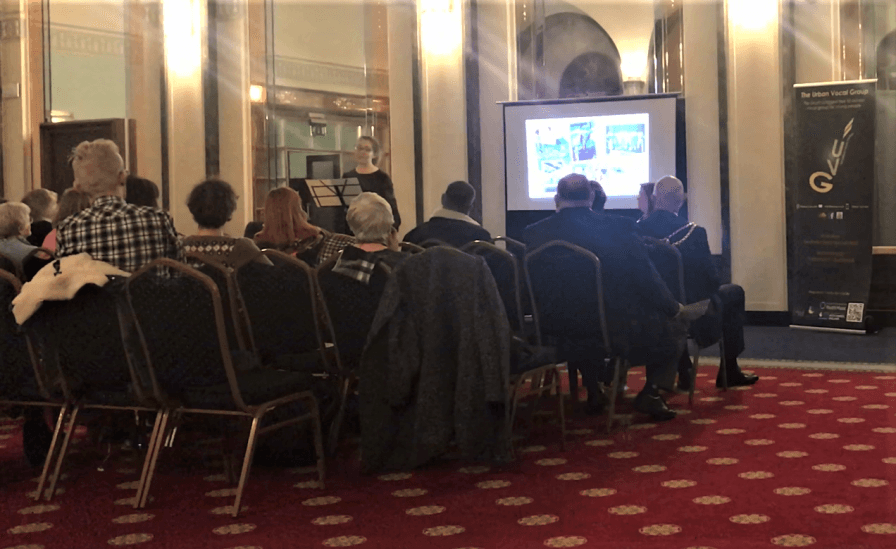Meeting in The Middle Symposium - 29th November 2017

Victoria Edwards is a young woman who has been singing with The Urban Vocal Group since 2011, shortly after suffering a brain haemorrhage. As part of her Gold Arts Award accreditation she chose to host a symposium to discuss and explore the barriers and perceptions regarding young people identified as having SEN/D accessing mainstream arts provision
The event was attended by The Mayor of Portsmouth and 20 delegates from across the arts and culture sector all of whom had a professional / personal interest in access and inclusion. It began with a very powerful and inspiring speech by Victoria, documenting her journey as a young person initially without a disability and her determination to continue living her life the way she wanted to after her stroke. There were also presentations by Charlie Fletcher - Director of The UVG, Judith Carrie who has national expertise in this area and the event concluded with a Q & A session
Watch Victoria reflect on her Arts Award Journey
The aim of the symposium was not necessarily to offer solutions, but to provide an opportunity to open up a dialogue that begins to identify the key challenges in providing an inclusive activity that engages a greater number of young people who are identified as having SEN/D. Prior to the symposium a survey was sent out asking 2 questions specifically on access to mainstream arts activities by young people with disabilities. We received 32 responses and the answers also shed some light on the broader question of why disabled people remain significantly less likely to participate in cultural, leisure and sporting activities than non-disabled people (DWP 2014[1])
When asked how easy they felt it was for young people identified as having SEN/D to access generic arts activities 91% of respondents felt that it was either not easy or at least ‘a bit difficult’
On the second question of perceived barriers to young people accessing generic arts activities.
This data together with feedback from delegates at the event suggests that there are challenges as much around perception as actual provision and that there is a need to better communicate the activities available and also to convince service users and carers that arts organisations have the resources and expertise to meet the needs of young people with SEN/D
There was a general consensus that inclusion should be a standard part of the planning process from project inception to delivery and taken into consideration as much as any other element when planning an arts project. As such it should be a factor not a fear. However there was also an acknowledgement that we cannot be all things to all people. Arts organisations can provide access and resources to cater for additional requirements, they can advocate the benefits that participation in music and other arts can have on health and wellbeing, they can make it free of charge but they can’t force people to participate. Furthermore, it was understood that there may be occasions where it is impractical to include everyone due to constraints on cost, support, accessibility or the activity itself.
However it was unanimously agreed that, if we communicate our activities more effectively, if we are open to adapting our practise and if we view inclusion as a factor not a fear we can encourage more participation from young people identified as having SEN/D.
Victoria reflects on her Gold Arts Award journey
“A brilliant idea, please do it again”
“I hadn't realised what the talk was so came open minded - was very impressed and interested”
“So good to see a young person taking charge”
[1] https://www.gov.uk/government/publications/disability-facts-and-figures/disability-facts-and-figures
